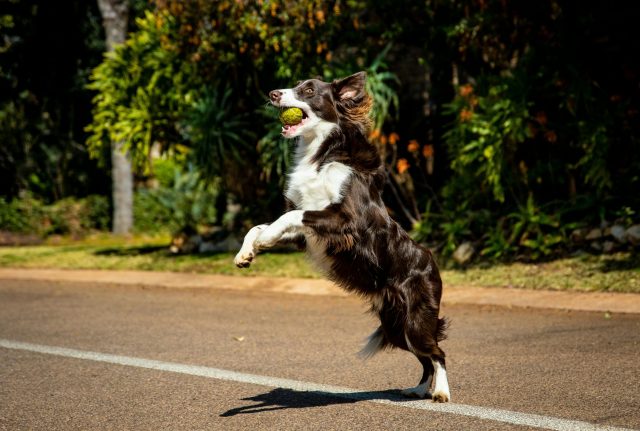If you’re a dog owner, you’ve probably witnessed your furry friend suddenly burst into a frantic sprint around the house or yard, seemingly out of nowhere. This seemingly erratic, high-energy behavior is commonly referred to as “dog zoomies.” Understanding what dog zoomies are and why they happen can help you better understand your dog’s behavior and ensure their well-being.
In this article, we will examine the phenomenon of dog zoomies, define what they are, explore the reasons behind them, identify common triggers, and discuss whether they are normal. We’ll also give tips on how to manage dog zoomies and when you should be concerned about them.

Introduction to What Are Dog Zoomies And Why Do They Happen?
Dog zoomies, also known as Frenetic Random Activity Periods (FRAPs), are a common and often amusing behavior seen in dogs. These bursts of energy can be both amusing and confusing to dog owners. To better understand your pet’s behavior, it’s important to explore what dog zoomies are and why they occur. By doing this, you can ensure that your dog stays safe during these high-energy episodes and address any underlying issues that may be contributing to this behavior.
Find Out Which Dog Breeds Are The Most Playful and Energetic
Defining Dog Zoomies
Dog zoomies are sudden, intense bursts of energy that cause dogs to run wild, often in circles or back and forth. Rapid, unpredictable movements characterize this behavior, and it can occur indoors or outdoors. Zooms are often short-lived, lasting only a few minutes, but they can leave a lasting impression on anyone who witnesses them. Common behaviors associated with dog zoomies include:
- Running at high speed
- Sudden turns and sudden stops
- Playful barking or growling
- Crouching or playing posture
Why Do Dog Zoomies Happen?
There are several reasons why dog zoomies occur, and they can vary from one dog to another. Understanding these reasons can help you better manage this behavior. The main factors include:
1. Physical Liberation
Dogs often experience zoomies as a way to release pent-up energy. This is especially common in puppies and young dogs who have a lot of energy to burn. After periods of rest or inactivity, such as after a nap or being confined, dogs may use zoomies to expend excess energy.
2. Emotional Expression
Zooms can also be a way for dogs to express excitement, happiness, or comfort. For example, your dog may get zoomies after a bath, when a favorite person comes home, or during playtime with other dogs.
3. Enhancing the Environment
Certain environmental factors can trigger zoomies in dogs. These include changes in the weather, new or exciting environments, or specific times of the day, such as early morning or evening when temperatures are cooler.
Common Triggers for Dog Zoomies
Understanding the common triggers for dog zoomies can help you predict and manage this behavior. Some common triggers include:
1. Play and Exercise Time
Engaging in playtime or physical exercise often leads to zoomies, as dogs are excited and energized.
2. Bath Time
Many dogs experience zoomies after a bath, possibly as a way to dry off, release pent-up energy, or simply because they feel refreshed.
3. After Meals
Some dogs may get zoomies after eating, especially if they are excited or if mealtime is followed by a break.
4. Night Hours
Zooms are usually more common at night when dogs have built up energy throughout the day, and temperatures are cooler, making it more comfortable for them to run around.
Are Dog Zoomies Normal?
Dog zoomies are generally considered normal and healthy behavior. They are a natural way for dogs to release energy and express their feelings. However, frequent or excessively intense zooming may indicate that your dog is not getting enough physical or mental stimulation. In such cases, it’s important to make sure your dog gets enough exercise and engages in activities to prevent excessive zooming.
How to Manage Dog Zoomies
Managing dog zoomies involves ensuring your dog’s safety and addressing the underlying causes of the behavior. Here are some tips to help you manage dog zoomies effectively:
Provide Regular Exercise
Make sure your dog gets regular exercise to help burn off excess energy. This can include daily walks, playtime, and engaging in activities such as fetch or agility training.
Discover The 15 Dog Breeds That Are The Best Playmates For Your Kids
Create a Safe Space
If your dog tends to get zoomies indoors, create a safe area where they can run without the risk of harming or damaging your home. Remove any obstacles or broken objects from the area.
Use Positive Reinforcement
Encourage calm behavior through positive reinforcement. Reward your dog with treats or praise when they display calm behavior and redirect their energy to appropriate activities, such as playing with toys.
When to Worry About Dog Zoomies
While zoomies are usually normal, there are situations where you should be concerned about this behavior. If your dog is exhibiting excessive zooming, seems overly anxious or agitated, or if other related behaviors include zoomies, it may be time to seek professional advice. Additionally, if your dog’s zoomies result in injury to themselves or damage to your home, it’s important to address the behavior immediately.
Learn About 9 Dog Breeds That Often Get Zoomies
Conclusion: Understanding Dog Zoomies and Ensuring Your Dog’s Well-Being
In conclusion, understanding what dog zoomies are and why they occur can help you manage this behavior effectively. By identifying triggers and making sure your dog gets enough physical and mental stimulation, you can help reduce zoomies and ensure your dog’s well-being. Remember that zoomies are a normal part of dog behavior, but if you have any concerns, don’t hesitate to seek professional guidance. By observing and understanding your dog’s behavior, you can create a safe and happy environment for your furry friend.



